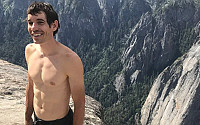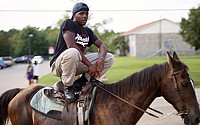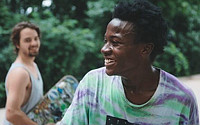| SHADOWS ON THE WALL | REVIEWS | NEWS | FESTIVAL | AWARDS | Q&A | ABOUT | TALKBACK | ||
 Shadows off the beaten path Shadows off the beaten path | ||
| Indies, foreigns, docs, revivals and shorts... | ||
|
On this page:
BEING FRANK: THE CHRIS SIEVEY STORY |
FREE SOLO HALE COUNTY THIS MORNING, THIS EVENING | MINDING THE GAP < < D O C S > > last update 19.Jan.19 See also: SHADOWS FILM FESTIVAL | ||
 R E V I E W B Y R I C H C L I N E
R E V I E W B Y R I C H C L I N E | ||
Being Frank: The Chris Sievey Story

| ||
|
dir-prd Steve Sullivan with Chris Sievey, Paula Sievey, Martin Sievey, Stirling Sievey, Asher Horsefield , Harry Sievey, Mark Radcliffe, Jon Ronson, Johnny Vegas, John Cooper Clarke, John Thomson, Ross Noble  release US Mar.18 sxsw, UK 29.Mar.19 18/UK 1h40 
|  This is the extraordinary story of the artist who created Frank Sidebottom (immortalised in the fictional 2014 film Frank). Documentarian Steve Sullivan has full access to Chris Sievey's personal archive of photos, props and extensive video recordings, and as Sievey's family and friends recall his life, it becomes a powerfully moving account of a talented man who never quite got the break he so clearly deserved.
This is the extraordinary story of the artist who created Frank Sidebottom (immortalised in the fictional 2014 film Frank). Documentarian Steve Sullivan has full access to Chris Sievey's personal archive of photos, props and extensive video recordings, and as Sievey's family and friends recall his life, it becomes a powerfully moving account of a talented man who never quite got the break he so clearly deserved.
A prolific musician from a young age, Chris and his brother Martin stormed Apple Records in the early 1971 demanding a deal. The label showed interest, but later event s left Chris frustrated. Back home near Manchester, he released music as The Freshies, but his biggest hit was quashed by random circumstances. Still, he kept writing music and designing album covers and comic books. Eventually he created Frank Sidebottom, hiding under a giant papier mache head and performing with a band including DJ Radcliffe and author Ronson. And he simply couldn't escape this role. The film moves briskly while finding depth at every stage, including Sievey's feelings about his own success, most notably the bitter irony that his celebrity was hidden behind a mask. He had plans to reveal his identity and continue his career as himself, but his life was cut short by cancer. He died at 54 in 2010. The story is told by a variety of people who worked with him, as well as his wife Paula and their three artistic-minded children Stirling, Asher and Harry. Their colourful stream of spoken anecdotes add to clips of Sievey's hilarious performances. They also express their complex love and respect for this man who may have been mentally ill. Chris and Frank were two distinct personalities, which he kept separate in his mind as he dealt with serious addiction problems and an inability to manage his finances. But he never stopped creating, writing and recording music, drawing elaborate illustrations, making TV programmes and animations. The film is fluidly edited to stir these elements in without losing a sense of Sievey's sparky sense of humour. His jokes were riotously close to the bone, playing with classic songs and big ideas in ways that were absurd but never silly. What makes the doc resonate so strongly is how it evokes a sense that perhaps in a parallel universe Chris Sievey is bigger than his heroes, The Beatles. And in some ways, by doing everything his own way, maybe this movie helps make that dream come true. | |
|
12 themes, language 22.Nov.18
| | |
 R E V I E W B Y R I C H C L I N E
R E V I E W B Y R I C H C L I N E | ||
Free Solo MUST
MUST  SEE SEE
| ||
|
dir Elizabeth Chai Vasarhelyi, Jimmy Chin prd Jimmy Chin, Elizabeth Chai Vasarhelyi, Evan Hayes, Shannon Dill with Alex Honnold, Tommy Caldwell, Sanni McCandless, Jimmy Chin, Dierdre Wolownick, Peter Croft, Mikey Schaefer, Cheyne Lempe  release US 28.Sep.18,
release US 28.Sep.18, UK 14.Dec.18 18/US NatGeo 1h40
|  Vertiginous cinematography and a likeable central figure make this documentary electrifying as it follows someone attempting something unthinkable. It's a strikingly well-assembled film with strong attention to detail, revealing the mental and physical strength it takes to free climb a previously unconquered cliff face. And the filmmakers remember to explore the emotional impact on him and those around him.
Vertiginous cinematography and a likeable central figure make this documentary electrifying as it follows someone attempting something unthinkable. It's a strikingly well-assembled film with strong attention to detail, revealing the mental and physical strength it takes to free climb a previously unconquered cliff face. And the filmmakers remember to explore the emotional impact on him and those around him.
At 33, Alex Honnold has done more than a thousand free solo climbs, with his toughest challenge being Yosemite's Half Dome. Now he's preparing to make the first free solo climb of the far more demanding nearby El Capitan, nearly 1,000 metres of sheer granite. Living in a van and constantly travelling, he has trouble finding a girlfriend. Then he meets McCandless and begins teaching her how to climb. As their relationship grows, she knows she has to encourage him. But if you're pushing the edge, eventually you're going to find it. In this sport, make one little mistake and you die. Honnold says this makes him feel more present. The film sticks close to him as he and McCandless develop their connection, even buying a house together in Vegas. Meanwhile, he maps the route with fellow climber Caldwell and travels to Morocco for training. Filmmaker Chin and his crew are also climbers, so they're on the rockface with them. The close-ups of fingers on tiny holds are as amazing as the epic wide shots. The climactic sequence is beyond jaw-dropping. Honnold also recounts his childhood in Sacramento as a "dorky loner". His family was never affectionate, so he only learned to hug others in his 20s and still struggles with self-image and motivation. He's amazed that he has turned what he loves into a career, and speaks about working through the fear until climbing isn't scary anymore. The film documents injuries that don't slow him down, and also the fact that he founded a global charity to lift people out of poverty. Caldwell laughs that climbing with Honnold is like a vice: he knows it's not good for him, but does it anyway. Chin talks about the pressure of making a free-soloing film, encouraging his friend to do something dangerous (there's a segment about top climbers who have died). For McCandless, life is about happiness, but Honnold pursues achievement. And those who love him know they can't take free soloing away from him. Even when he has doubts about El Capitan, Honnold doesn't give up. And watching him surmount his demons is both inspiring and heart-stopping. | |
|
12 themes, language 11.Dec.18 | ||
 R E V I E W B Y R I C H C L I N E
R E V I E W B Y R I C H C L I N E | ||
Hale County This Morning, This Evening

| ||
|
dir-scr RaMell Ross prd RaMell Ross, Joslyn Barnes, Su Kim with Quincy Bryant, Daniel Collins, Latrenda 'Boosie' Ash, Mary B Collins, Kyrie Bryant, Tomeko Elliott, Nathaniel Davis, Shadedra Collins  release US 14.Sep.18,
release US 14.Sep.18, UK 18.Jan.19 18/US 1h16
|  Loose and unconstructed, this beautifully shot documentary is an evocative portrait of both the physical landscape and the local culture. It skilfully captures the feeling of life in the Deep South, as filmmaker RaMell Ross shoots scenes around Selma, Alabama. Much of the imagery is exquisite, seemingly random in the way it is inventively edited together to create a vivid slice of life.
Loose and unconstructed, this beautifully shot documentary is an evocative portrait of both the physical landscape and the local culture. It skilfully captures the feeling of life in the Deep South, as filmmaker RaMell Ross shoots scenes around Selma, Alabama. Much of the imagery is exquisite, seemingly random in the way it is inventively edited together to create a vivid slice of life.
The film's loose narrative builds around snippets of conversations with two young black men who play basketball at Selma University. Quincy only wants life to be better for the children he's having with Boosie. Daniel is a lively teen who knows he needs to get into a good school if he hopes to make something of his life. Both dread taking jobs at the local catfish factory, but there aren't many options for them. Along the way, there are moments of transcendent happiness as well as deep sadness. With a superb use of light and colour, and a variety of clever visual touches, Ross touches on a range of issues in this community, most notably a yearning for respect and opportunity. The film is punctuated with ponderous captions ("What is the orbit of our dreaming?" or "Where does time reside?") and artful camerawork that gives it a moody, haunting tone. But the people on-screen are full of energy and attitude. And the creative filmmaking is underscored with meaning, such as a long tracking shot following Daniel through a solo, sweat-producing practice on the basketball court. Shooting over several years, Ross has a remarkable eye for detail, catching throwaway moments that are usually left off-screen and then editing them into the narrative in ways that add jarring insight into African-American subculture. Indeed, his stated goal is to explore "how we came to be seen". He moved to the area as a basketball coach, so there are frequent segments that reveal rhythms in the locker room and on the court, as well as visiting his players in their homes. There's a sense that the police are never far outside the film's framing, their flashing lights reflecting in the mist. One guy wonders what the world would be like without guns, imagining police chasing down suspects with spears. And Ross' poetic approach to this material extends to some very pointed sequences, including a brief glimpse of a plantation house intercut with clips of Vaudeville legend Bert Williams peering hopefully through the trees. | |
|
PG themes, language 13.Jan.19
| | |
 R E V I E W B Y R I C H C L I N E
R E V I E W B Y R I C H C L I N E | ||
Minding the Gap

| ||
|
dir Bing Liu prd Bing Liu, Diane Moy Quon with Zack Mulligan, Keire Johnson, Bing Liu, Nina Bowgren, Kent Abernathy, Mengyue Bolen, Roberta, Rory, Eric, Vickie  release US 17.Aug.18, UK 22.Mar.19 18/US 1h38
|  Filmmaker Bing Liu spent 12 years documenting the lives of his two best friends as the three of them hang out, chat about their experiences and mostly do what they love best: skateboarding. It's a beautifully shot and edited film that taps into something important about American society and the legacy of broken and abusive families. It's moving without ever feeling too heavy.
Filmmaker Bing Liu spent 12 years documenting the lives of his two best friends as the three of them hang out, chat about their experiences and mostly do what they love best: skateboarding. It's a beautifully shot and edited film that taps into something important about American society and the legacy of broken and abusive families. It's moving without ever feeling too heavy.
In Rockport, Illinois, there isn't much for a teen boy to do but hit the skateboard parks and learn some whizzy footwork. They think growing up will be easy, and are unprepared for both the challenges of manhood and the pressures society puts on them to behave a certain way. Zack's girlfriend Nina is pregnant with his son, and he wishes there was a course in fatherhood. Not that he would put his mind to it, as he prefers to smoke weed than work. Kiere had a troubled relationship with his dad, who died when he was young. And as he turns 18 he feels the need to do something with his life. Liu intercuts video footage taken over all of these years of friendship, from their early teens to their mid-20s. And in between the stories of his two best pals, he tentatively digs into his own horrific abuse at the hands of his stepfather, interviewing his mother Mengyue about it while clearly not ready to share his own feelings on-camera. Taken together, these three narrative strands are striking simply because they feel so normal. And they really shouldn't be. The film pivots around fantastic clips of skateboarding tricks, revealing how these three young men use the sport as a survival mechanism. Skating is important to them because it allows them to control all the details. Each of these three guys is engaging, with distinct personalities that make them compelling and sympathetic. These aren't underprivileged youths, they're guys who live in a community that has a grim history of domestic abuse. This has had an impact everyone, whether first or second hand. Liu is a gifted photographer and editor, crafting a hugely involving film out of what is essentially a decade of home videos. This leaves the narrative feeling a bit thin and uneven. He bravely exposes his personal story on-screen, but is visually detached. And unlike the other two, Zack's backstory remains unexplored. But then this isn't a film that sets out to explain why these things happen; it is simply presenting the shifting patterns of society in a fresh, insightful way. | |
|
15 themes, language 17.Jan.19 | ||


See also: SHADOWS FILM FESTIVAL © 2019 by Rich Cline, Shadows
on the Wall
| ||